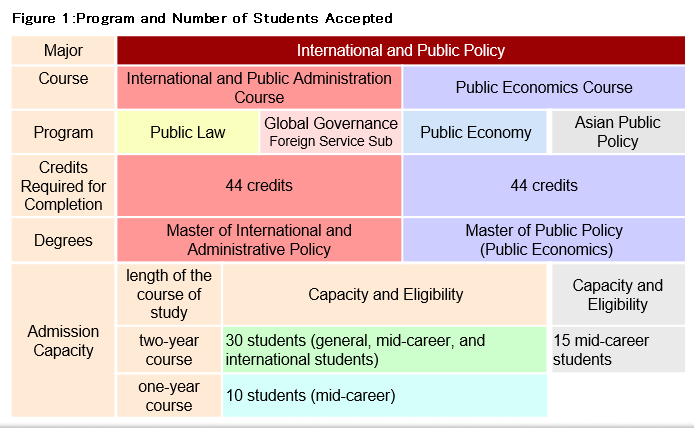



1.Program
As shown in Fig. 1, the School of International and Public Policy consists of 2 courses: The "International and Public Administration Course" that places an emphasis on an approach mainly from law and international relations, and the "Public Economics Course" which is based on economics. Each of these two courses is divided into two programs, "Public Law", "Global Governance", and "Public Economics" and "Asian Public Policy, " respectively.

The Asian Public Policy Program is a program offered mainly to international students working for public sectors in Asian countries. All of the classes are conducted in English, and students will need to complete 2 years of education to obtain a Professional Master's degree. On the other hand, mid-career students with previous work experiences can obtain a Professional Master's degree in 1 year from the other 3 programs. The Global Governance Program is a program that has many international students and most of the classes are conducted in English. The program also offers the Foreign Service Sub-Program (FSS) which accepts mid-career officers and international students from abroad. The FSS students are expected to complete the master's program in two years by taking courses taught in English. The number of students accepted for each program is shown in Fig. 1, and separate entrance exams are conducted for each program.
The primary students we have in mind are mid-career students who are working as national, local, and international civil servants, staff of government related organizations, NGO/NPOs and think-tanks, as well as newly graduated students who wish to work in these organizations in the future. Regardless of their career, however, those students that have strong interests in public policies and wish to study in depth are of course all welcome.
2. Characteristics in Education and Research
Next, we would like to explain some of the characteristics of education and research at the School of International and Public Policy at Hitotsubashi University.
The number of students accepted to the School of International and Public Policy is 55 every year. We do our best to select a good balance of new graduates, mid-career students and international students, in hopes that new and innovative discussions can be facilitated on various policy issues through the exchange of opinions among different groups. One of the traditions of Hitotsubashi University is the close relationship between professors and students. We continue this tradition at the School of International and Public Policy. We feel that having small classes is a must to foster and train true professionals in policy and decision making.
The characteristic of the courses at the School of International and Public Policy is that we offer a variety of lectures both in English and in Japanese. The wide range of lectures given in English is something that you will not see in other graduate schools in public policy. Students who have been recognized to have a certain degree of English ability can register for these English courses. Moreover, our university hosts many seminars and symposiums conducted in English which anyone can participate in. They offer students an opportunity to think about policy issues in English. We hope that students actively participate in many of the lectures and seminars offered in English.
At the School of International and Public Policy at Hitotsubashi University, we take a multi-dimensional approach to various policy issues, based on the framework of law, international relations and economics. While students are required to select a major or program they wish to study in order to specialize in a particular field, they are also recommended to study and become familiar with various other approaches. As part of the curriculum the program offers subjects called "cross-program subjects" taught jointly by faculty members from different academic fields, where students and faculty members are given the opportunity to discuss policies from various perspectives.
One of the other traditions at Hitotsubashi University is the strong relations with the private sector. In line with this tradition, the School of International and Public Policy conducts education and research on policy through collaboration with not only government but also private organizations. With the help of various organizations of the private sector, the program offers relay lectures by guest speakers from private think-tanks, and provides professional training through internship or consulting projects in order to foster leaders that can analyze policies from the perspective of the private sector.
Needless to say, cooperation with countries in the Asia-Pacific region is important for Japan. Our university has promoted activities for the establishment of an education and research centre in the Asia-Pacific region through two educational programs, "Program in International and Asia-Pacific Region" which comprises the core of the Global Governance Program, and the "Asian Public Policy Course" which comprises the core of the Asian Public Policy Program, by facilitating interaction with scholars and students from this important region. These two programs have now been integrated into the School of International and Public Policy at Hitotsubashi University, which continues to promote activities to facilitate the formation of a centre for research and education.

